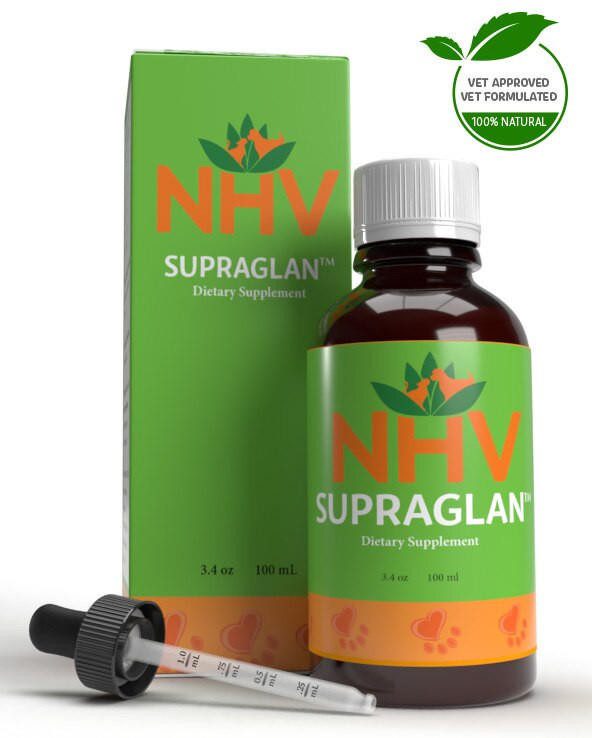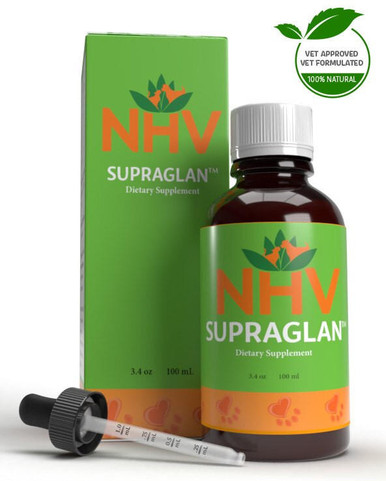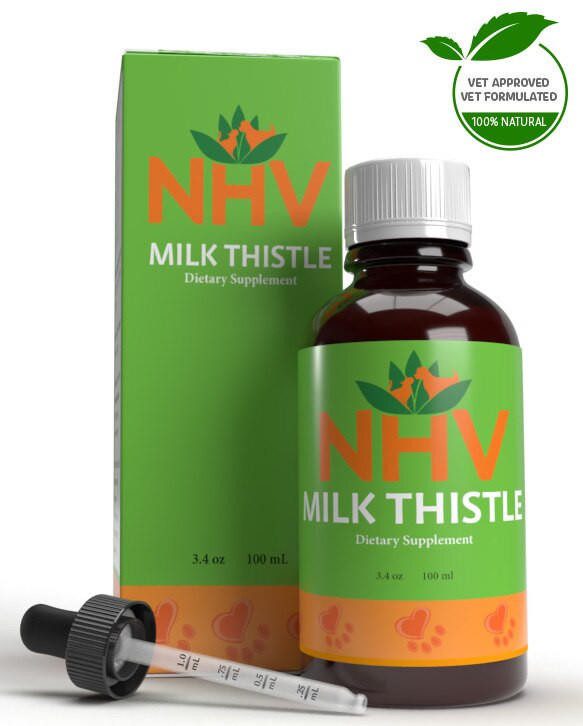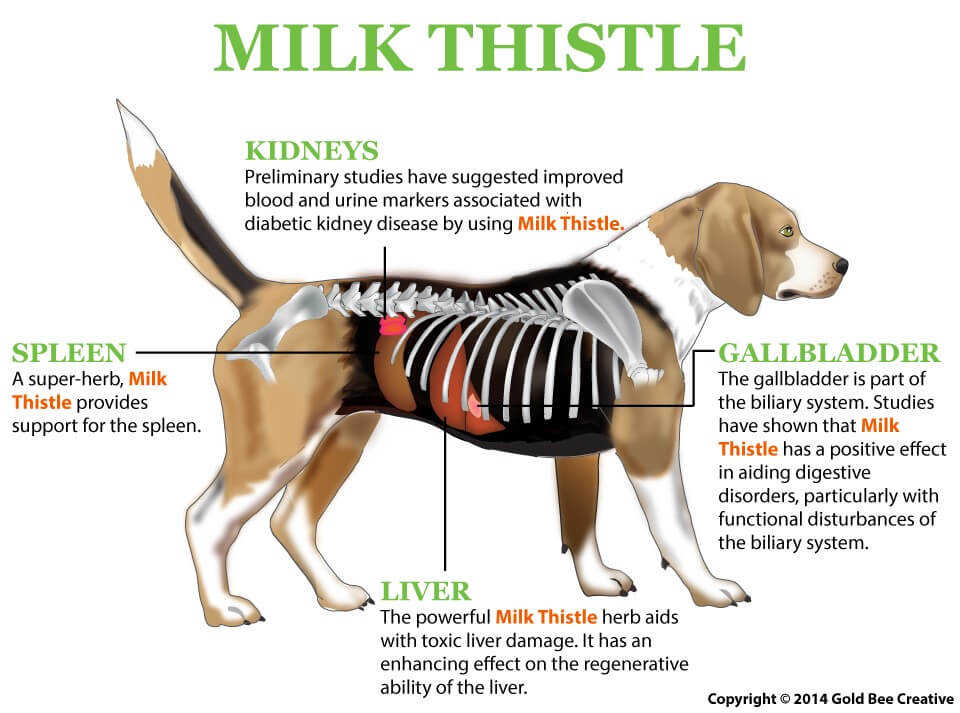adrenal support

free shipping over $100 (USA & Canada)
1-877-937-4372 the pet expert hotline

Supraglan & Milk Thistle to Support Dog & Pet Cushing's Disease


Cushing’s disease or hyperadrenocorticism in dogs is an endocrine disease resulting in a set of symptoms observed when the body is exposed to excess cortisone over a long period of time. It commonly affects middle-aged dogs and the most common breeds affected are poodles, dachshunds, and beagles.
Complete blood workup is recommended and specific Cushing’s disease tests are performed to diagnose Cushing’s disease in dogs.
Cortisol is a hormone produced by the adrenal glands that are located on top of the kidneys. Cortisol is stored in the adrenal glands and is released in times of stress where it helps our bodies prepare for a fight or flight situation. It adjusts the metabolism to expect physical exertion by mobilizing fat and sugar stores and retaining sodium and water. It puts us in a state of a breakdown so that our stored resources can be used quickly. However, if the body is exposed to this hormone on an ongoing basis instead of during short stressful periods only, the state of breakdown becomes debilitating. This disease affects a number of bodily systems, and signs of the disease vary considerably between cases.
The most common symptoms of Cushing’s disease in dogs that we see in our clinic include:
There are three types of conditions that can lead to Cushing’s syndrome and it is important to know which one your dog has since the treatments are different.
1) Pituitary Dependent Cushing’s syndrome – is an enlargement of the pituitary gland (85% of dogs have this type),
2) Adrenal-dependent Cushing’s syndrome – is a tumor of the adrenal gland (15% of dogs have this type)
3) Iatrogenic – overuse of steroids medications in your dog.
It is important to visit your veterinarian if any of the above signs are seen in your dog – The above symptoms can mimic other endocrine or metabolic diseases. Complete blood workup is recommended and specific Cushing’s disease tests are performed to diagnose Cushing’s disease in dogs. A low dose dexamethasone suppression test, and or high dose dexamethasone suppression test, and an adrenocorticotropin hormone (ACTH) stimulation test. An abdominal ultrasound of the adrenal glands is helpful in differentiating between adrenal gland tumor versus pituitary-dependent Cushing’s disease.
The most commonly prescribed medications to treat PDH Cushing’s disease include trilostane or lysodren. Your veterinarian will know which medication will be best for your dog. However, you should be aware that there are side effects to the medications used for Cushing’s in dogs.
Surgery is the most common treatment for adrenal gland tumors.
NHV Natural Pet Products does have a natural supplement called Supraglan, which may be beneficial in managing Cushing’s disease in dogs. Supraglan contains herbs like borage, astragalus, and eleuthero, which may help support the adrenal gland. In addition to the Supraglan, it is a good idea to use the Milk Thistle to help detoxify the liver. Both the Supraglan and the Milk Thistle can be used in conjunction with western medication or alone. Always consult your veterinarian before the use of supplements, and during use so that they may monitor your pet.
High levels of fish oils (you may want to try NHV PetOmega-3), antioxidants, and a good quality diet are also recommended.
We have also successfully used acupuncture and Chinese herbal therapies to improve the management of Cushing’s disease.
Do you think your dog may have Cushing’s Disease? We are available for online consultations. Book here.
adrenal support

Natural Cushing’s Disease, Adrenal, and Addison’s Support for dogs
buy 2 and save $3
3 month supply for a small to medium size
Our vet-formulated canine adrenal and Cushing’s support product can help your dog get the nutrients they need to balance vital hormones and promote healthy adrenal gland function.

Our vet-formulated canine adrenal and Cushing’s support product can help your dog get the nutrients they need to balance vital hormones and promote healthy adrenal gland function.
Dogs with adrenal disorders like Cushing’s and Addison’s may have other health issues that can affect a pup’s quality of life. Supraglan™ canine adrenal support supplements can help these dogs.
The overproduction of cortisol in canines with Cushing’s disease can cause excessive thirst, urination, and appetite. These symptoms can result in other side effects like obesity, fat pads near the neck, and low energy.
Cushing’s disease may sometimes be the result of continued steroid use or a tumor on the adrenal gland. Your vet’s treatment plan for Cushing’s or other canine adrenal support will likely include medication and potential surgery in cases where a tumor is present. Feeding Supraglan™ supplements to your dog alongside the vet’s treatment will help them through the process.
Our adrenal supplements can help dogs undergoing treatment for diseases like Cushing’s with powerful and natural ingredients that help improve adrenal gland function, regulate metabolism, and promote good digestion.
Supraglan™ is formulated with ingredients like borage which help to balance a dog’s endocrine system, astragalus for its anti-inflammatory effects, eleuthero to help regulate adrenal gland function, and other potent ingredients key in supporting their overall health.
For additional support, see NHV’s other adrenal disorder supplements and kits.
All of NHV’s canine adrenal support products are ethically sourced, free of GMOs, and tested by a third party to ensure concentration and product quality. Find natural solutions you can trust in your dog’s health regimen when you shop at NHV.
Borage – Helps to balance endocrine system functions, restore the adrenal cortex, and eliminate toxins
Astragalus – Contains anti-inflammatory properties and balance your dog’s immunity
Bistort – Contains anti-inflammatory properties that benefit the liver and kidneys
Eleuthero – Helps balance (Acts on, supports, aids, assists) adrenal gland function and may help balance metabolism
Wild Yam – Helps balance and normalizes liver function
Licorice – Contains anti-inflammatory properties and balance adrenal gland function
Dandelion – Helps balance liver secretions and promotes good digestion
Select your pet's weight to determine the correct dose.
To be taken twice daily. Determine your pet’s weight and then use the easy chart below to determine the correct dose. This is the minimum dosage.
Pet's Weight Dosage
0 - 15 lb = 0.5 ml
16 - 30 lb = 1.0 ml
31 - 45 lb = 1.5 ml
46 - 60 lb = 2.0 ml
61 - 75 lb = 2.5 ml
Over 75 lb = 3.0 ml
For small animals (rabbits, ferrets), avians and reptiles use 1 drop for every 2 lb of body weight.
How to Administer
Shake well before use. The easiest method is to use the dropper provided and place the drops into your pet’s food or favorite treat. You can also use the dropper and squirt directly into the pet’s mouth. Some pets can be finicky, if this occurs consider hiding the drops in foods most pet’s love such as fish, chicken or yogurt or a favorite treat. If your pet only eats dry food then soak a few kibbles at feeding time.
For Best Results
Herbal dietary supplements are beneficial to the health and well-being of your pet and are safe for long-term use. Every pet responds to natural herbal supplements differently, therefore it is important to be consistent and administer the product daily. Supplements generally take two to four weeks to take effect, however this will vary from one animal to the next.
Product Storage
All NHV Natural Pet Products are pure herbal extracts and contain no artificial additives, preservatives or coloring. Shelf life after opening is 6 months and must be refrigerated after opening.
Cautions and Contraindications
Do not use Supraglan in pregnant or nursing animals. Speak to your vet before using our products. A second visit is recommended if your pet’s condition does not improve, or deteriorates after continued use of the supplements.
All information provided by NHV Natural Pet Products is for educational purposes only.
Dogs with adrenal disorders like Cushing’s and Addison’s may have other health issues that can affect a pup’s quality of life. Supraglan™ canine adrenal support supplements can help these dogs.
The overproduction of cortisol in canines with Cushing’s disease can cause excessive thirst, urination, and appetite. These symptoms can result in other side effects like obesity, fat pads near the neck, and low energy.
Cushing’s disease may sometimes be the result of continued steroid use or a tumor on the adrenal gland. Your vet’s treatment plan for Cushing’s or other canine adrenal support will likely include medication and potential surgery in cases where a tumor is present. Feeding Supraglan™ supplements to your dog alongside the vet’s treatment will help them through the process.
Our adrenal supplements can help dogs undergoing treatment for diseases like Cushing’s with powerful and natural ingredients that help improve adrenal gland function, regulate metabolism, and promote good digestion.
Supraglan™ is formulated with ingredients like borage which help to balance a dog’s endocrine system, astragalus for its anti-inflammatory effects, eleuthero to help regulate adrenal gland function, and other potent ingredients key in supporting their overall health.
For additional support, see NHV’s other adrenal disorder supplements and kits.
All of NHV’s canine adrenal support products are ethically sourced, free of GMOs, and tested by a third party to ensure concentration and product quality. Find natural solutions you can trust in your dog’s health regimen when you shop at NHV.
Borage – Helps to balance endocrine system functions, restore the adrenal cortex, and eliminate toxins
Astragalus – Contains anti-inflammatory properties and balance your dog’s immunity
Bistort – Contains anti-inflammatory properties that benefit the liver and kidneys
Eleuthero – Helps balance (Acts on, supports, aids, assists) adrenal gland function and may help balance metabolism
Wild Yam – Helps balance and normalizes liver function
Licorice – Contains anti-inflammatory properties and balance adrenal gland function
Dandelion – Helps balance liver secretions and promotes good digestion
Select your pet's weight to determine the correct dose.
To be taken twice daily. Determine your pet’s weight and then use the easy chart below to determine the correct dose. This is the minimum dosage.
Pet's Weight Dosage
0 - 15 lb = 0.5 ml
16 - 30 lb = 1.0 ml
31 - 45 lb = 1.5 ml
46 - 60 lb = 2.0 ml
61 - 75 lb = 2.5 ml
Over 75 lb = 3.0 ml
For small animals (rabbits, ferrets), avians and reptiles use 1 drop for every 2 lb of body weight.
How to Administer
Shake well before use. The easiest method is to use the dropper provided and place the drops into your pet’s food or favorite treat. You can also use the dropper and squirt directly into the pet’s mouth. Some pets can be finicky, if this occurs consider hiding the drops in foods most pet’s love such as fish, chicken or yogurt or a favorite treat. If your pet only eats dry food then soak a few kibbles at feeding time.
For Best Results
Herbal dietary supplements are beneficial to the health and well-being of your pet and are safe for long-term use. Every pet responds to natural herbal supplements differently, therefore it is important to be consistent and administer the product daily. Supplements generally take two to four weeks to take effect, however this will vary from one animal to the next.
Product Storage
All NHV Natural Pet Products are pure herbal extracts and contain no artificial additives, preservatives or coloring. Shelf life after opening is 6 months and must be refrigerated after opening.
Cautions and Contraindications
Do not use Supraglan in pregnant or nursing animals. Speak to your vet before using our products. A second visit is recommended if your pet’s condition does not improve, or deteriorates after continued use of the supplements.
All information provided by NHV Natural Pet Products is for educational purposes only.
liver support

Support for liver and kidney detox and cancer support in dogs
3 month supply for a small to medium size pet
These effects help to remove chemicals and toxins that can accumulate in your dog’s system. It is one of the few herbs with no equivalent in conventional medicine.


These effects help to remove chemicals and toxins that can accumulate in your dog’s system. It is one of the few herbs with no equivalent in conventional medicine.

Milk Thistle is a powerful herb that’s been used by humans for thousands of years. The active ingredient, silymarin, has been shown through scientific studies to possess strong anti-inflammatory, antioxidant, and detoxifying properties. It also promotes cellular regeneration and repair.
This supplement by NHV Natural Pet Products uses 100% natural milk thistle to support dogs through liver and kidney conditions in addition to conventional treatment by their veterinarian.
Milk thistle improves kidney function due to the damage from:
The extraordinary antioxidant properties of milk thistle for dog extract acts to:
The scientific name for milk thistle is Silybum Marianum. It’s also referred to as wild artichoke and holy thistle.
Milk thistle for dog liver support can be used in conjunction with conventional treatments and is glycerin based and safe for long-term use. You can read more about the benefits of using milk thistle on Dr. Hillary Cook’s blog.
At NHV, all of our products including milk thistle for dog kidney support are plant-based and make excellent proactive support for many health conditions. If you have questions on milk thistle for dogs or any of our holistic supplements, you can ask an expert at NHV because we put your pet first when it comes to health and healing naturally.

Select your pet's weight to determine the correct dose.
To be taken twice daily. Determine your pet’s weight and then use the easy chart below to determine the correct dose. This is the minimum dosage.
Pet's Weight Dosage
0 - 15 lb = 0.5 ml
16 - 30 lb = 1.0 ml
31 - 45 lb = 1.5 ml
46 - 60 lb = 2.0 ml
61 - 75 lb = 2.5 ml
Over 75 lb = 3.0 ml
How to Administer
Shake well before use. The easiest method is to use the dropper provide and places the drops into your pet’s food or favorite treat. You can also use the dropper and squirt directly into the pet’s mouth.
Some pets can be finicky, if this occurs consider hiding the drops in foods most pet’s love such as fish, chicken or yogurt or a favourite treat. If your pet only eats dry food then soak a few kibbles at feeding time.
For Best Results
Herbal dietary supplements are beneficial to the health and wellbeing of your pet and are safe for long-term use. Every pet responds to natural herbal supplements differently, therefore it is important to be consistent and administer the product daily. Supplements generally take two to four weeks to take effect, however this will vary from one animal to the next.
Product Storage
All NHV Natural Pet Products are pure herbal extracts and contain no artificial additives, preservatives or coloring. Shelf life after opening is 6 months and must be refrigerated after opening.
Cautions and Contraindications
Do not use Milk Thistle in pregnant or nursing animals. Speak to your vet before using our products. A second visit is recommended if your pet’s condition does not improve, or deteriorates after continued use of the supplements.
All information provided by NHV Natural Pet Products is for educational purposes only.
Milk Thistle is a powerful herb that’s been used by humans for thousands of years. The active ingredient, silymarin, has been shown through scientific studies to possess strong anti-inflammatory, antioxidant, and detoxifying properties. It also promotes cellular regeneration and repair.
This supplement by NHV Natural Pet Products uses 100% natural milk thistle to support dogs through liver and kidney conditions in addition to conventional treatment by their veterinarian.
Milk thistle improves kidney function due to the damage from:
The extraordinary antioxidant properties of milk thistle for dog extract acts to:
The scientific name for milk thistle is Silybum Marianum. It’s also referred to as wild artichoke and holy thistle.
Milk thistle for dog liver support can be used in conjunction with conventional treatments and is glycerin based and safe for long-term use. You can read more about the benefits of using milk thistle on Dr. Hillary Cook’s blog.
At NHV, all of our products including milk thistle for dog kidney support are plant-based and make excellent proactive support for many health conditions. If you have questions on milk thistle for dogs or any of our holistic supplements, you can ask an expert at NHV because we put your pet first when it comes to health and healing naturally.

Select your pet's weight to determine the correct dose.
To be taken twice daily. Determine your pet’s weight and then use the easy chart below to determine the correct dose. This is the minimum dosage.
Pet's Weight Dosage
0 - 15 lb = 0.5 ml
16 - 30 lb = 1.0 ml
31 - 45 lb = 1.5 ml
46 - 60 lb = 2.0 ml
61 - 75 lb = 2.5 ml
Over 75 lb = 3.0 ml
How to Administer
Shake well before use. The easiest method is to use the dropper provide and places the drops into your pet’s food or favorite treat. You can also use the dropper and squirt directly into the pet’s mouth.
Some pets can be finicky, if this occurs consider hiding the drops in foods most pet’s love such as fish, chicken or yogurt or a favourite treat. If your pet only eats dry food then soak a few kibbles at feeding time.
For Best Results
Herbal dietary supplements are beneficial to the health and wellbeing of your pet and are safe for long-term use. Every pet responds to natural herbal supplements differently, therefore it is important to be consistent and administer the product daily. Supplements generally take two to four weeks to take effect, however this will vary from one animal to the next.
Product Storage
All NHV Natural Pet Products are pure herbal extracts and contain no artificial additives, preservatives or coloring. Shelf life after opening is 6 months and must be refrigerated after opening.
Cautions and Contraindications
Do not use Milk Thistle in pregnant or nursing animals. Speak to your vet before using our products. A second visit is recommended if your pet’s condition does not improve, or deteriorates after continued use of the supplements.
All information provided by NHV Natural Pet Products is for educational purposes only.
adrenal support

Supraglan, Milk Thistle & Multi Essentials
bundle and save with pet expert kits
3 month supply for a small to medium size pet.
Help your pet combat Adrenal Disorders with all natural supplements formulated to ease symptoms, support your pet's recovery and improve their overall health.


Help your pet combat Adrenal Disorders with all natural supplements formulated to ease symptoms, support your pet's recovery and improve their overall health.

To be taken twice daily. Determine your pet’s weight and then use the easy chart below to determine the correct dose. This is the minimum dosage.
Pet's Weight Dosage
0 - 15 lb = 0.5 ml
16 - 30 lb = 1.0 ml
31 - 45 lb = 1.5 ml
46 - 60 lb = 2.0 ml
61 - 75 lb = 2.5 ml
Over 75 lb = 3.0 ml
For small animals (rabbits, ferrets), avians and reptiles use 1 drop for every 2 lb of body weight.
How to Administer
Shake well before use. The easiest method is to use the dropper provided and place the drops into your pet’s food or favorite treat. You can also use the dropper and squirt directly into the pet’s mouth. Some pets can be finicky, if this occurs consider hiding the drops in foods most pet’s love such as fish, chicken or yogurt or a favorite treat. If your pet only eats dry food then soak a few kibbles at feeding time.
For Best Results
Herbal dietary supplements are beneficial to the health and well-being of your pet and are safe for long-term use. Every pet responds to natural herbal supplements differently, therefore it is important to be consistent and administer the product daily. Supplements generally take two to four weeks to take effect, however this will vary from one animal to the next.
Product Storage
All NHV Natural Pet Products are pure herbal extracts and contain no artificial additives, preservatives or coloring. Shelf life after opening is 6 months and must be refrigerated after opening.
Cautions and Contraindications
Do not use Supraglan in pregnant or nursing animals. Speak to your vet before using our products. A second visit is recommended if your pet’s condition does not improve, or deteriorates after continued use of the supplements.
All information provided by NHV Natural Pet Products is for educational purposes only.
Select your pet's weight to determine the correct dose.
Addison's disease is also known as hypoadrenocorticism. This means that the adrenal system is underactive and does not produce enough natural corticosteroids for the body. Cushing's is also known as hyperadrenocoticism, so it is the opposite of Addison's, causing an overactive adrenal system which creates too much natural corticosteroid.
Our pet experts are happy to help you with any questions you may have at any time. You can reach us via email, or on any of our social channels, or give us a call!
Yes, absolutely. In fact that is how most of our pet parents administer the supplements to their pets.
Yes, absolutely the kit will be helpful as proactive care as well.
To be taken twice daily. Determine your pet’s weight and then use the easy chart below to determine the correct dose. This is the minimum dosage.
Pet's Weight Dosage
0 - 15 lb = 0.5 ml
16 - 30 lb = 1.0 ml
31 - 45 lb = 1.5 ml
46 - 60 lb = 2.0 ml
61 - 75 lb = 2.5 ml
Over 75 lb = 3.0 ml
For small animals (rabbits, ferrets), avians and reptiles use 1 drop for every 2 lb of body weight.
How to Administer
Shake well before use. The easiest method is to use the dropper provided and place the drops into your pet’s food or favorite treat. You can also use the dropper and squirt directly into the pet’s mouth. Some pets can be finicky, if this occurs consider hiding the drops in foods most pet’s love such as fish, chicken or yogurt or a favorite treat. If your pet only eats dry food then soak a few kibbles at feeding time.
For Best Results
Herbal dietary supplements are beneficial to the health and well-being of your pet and are safe for long-term use. Every pet responds to natural herbal supplements differently, therefore it is important to be consistent and administer the product daily. Supplements generally take two to four weeks to take effect, however this will vary from one animal to the next.
Product Storage
All NHV Natural Pet Products are pure herbal extracts and contain no artificial additives, preservatives or coloring. Shelf life after opening is 6 months and must be refrigerated after opening.
Cautions and Contraindications
Do not use Supraglan in pregnant or nursing animals. Speak to your vet before using our products. A second visit is recommended if your pet’s condition does not improve, or deteriorates after continued use of the supplements.
All information provided by NHV Natural Pet Products is for educational purposes only.
Select your pet's weight to determine the correct dose.
Addison's disease is also known as hypoadrenocorticism. This means that the adrenal system is underactive and does not produce enough natural corticosteroids for the body. Cushing's is also known as hyperadrenocoticism, so it is the opposite of Addison's, causing an overactive adrenal system which creates too much natural corticosteroid.
Our pet experts are happy to help you with any questions you may have at any time. You can reach us via email, or on any of our social channels, or give us a call!
Yes, absolutely. In fact that is how most of our pet parents administer the supplements to their pets.
Yes, absolutely the kit will be helpful as proactive care as well.
Published: August 26, 2016
2 replies
My beagle was diagnosed with Cushings 3 months ago. She had severe side effects from using Trilostane and I stopped the medication after about 6 weeks.
When I got home from work today, she could not stand up. Is this due to the disease?
Hello Marlene,
We’re so sad to hear of your Beagle’s diagnosis, we know how difficult it can be when our fur baby’s have a bad reaction to medication.
We recommend the use of our Adrenal Support & Nutritional Balance Kit found here: https://www.nhvnaturalpetproducts.com/Adrenal-Super-Support-and-Nutritional-Balance-Kit
This will help to support your pets adrenal function and address many of the symptoms of Cushing’s disease and also help to detox your pets system and support the liver.
Muscle weakness is a common symptom of Cushing’s Disease. You should always check with your veterinarian to ensure there is not an underlying cause such as an injury or bone condition.
Please do reach out if you have any questions and we are happy to help you and your beloved Beagle.